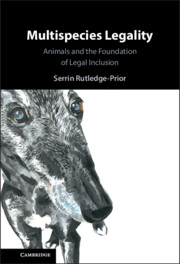Book contents
- Multispecies Legality
- Multispecies Legality
- Copyright page
- Dedication
- Contents
- Acknowledgements
- Introduction
- 1 Animals Already Have Legal Rights
- 2 A Matter of Justice
- 3 Unnecessary, Inconsistent, and Exclusionary
- 4 Losing the Trees for the Forest
- 5 All Animals Are Interested
- 6 Too Much, Too Little, Too Unlikely
- 7 Embedding Multispecies Interests in Political Institutions
- Conclusion
- References
- Index
Conclusion
Published online by Cambridge University Press: 18 June 2025
- Multispecies Legality
- Multispecies Legality
- Copyright page
- Dedication
- Contents
- Acknowledgements
- Introduction
- 1 Animals Already Have Legal Rights
- 2 A Matter of Justice
- 3 Unnecessary, Inconsistent, and Exclusionary
- 4 Losing the Trees for the Forest
- 5 All Animals Are Interested
- 6 Too Much, Too Little, Too Unlikely
- 7 Embedding Multispecies Interests in Political Institutions
- Conclusion
- References
- Index
Summary
The concluding chapter reiterates the goal of the book: to offer a solution to animals’ lack of legal inclusion by offering a new foundation of legal subjectivity. The Principle of Multispecies Legality provides such a foundation for animals and, indeed, all those beings and entities with interests. By contrast with the present paradigm of legal personhood, the PML is not premised on a vision of the ‘archetypal’ human which serves to exclude not only animals but also many vulnerable human groups. The PML is also an improvement over the rights of nature, in that it more straightforwardly recognises the interests and worth of individual animals and does not maintain the ontological barrier between humans and all other nature. Finally, we are reminded that making change takes a multispecies village: that the PML is only as good as those who are willing to implement it. In order to ensure real change for animals and other interested beings, we need to work to encourage greater respect for the non-human world.
Keywords
Information
- Type
- Chapter
- Information
- Multispecies LegalityAnimals and the Foundation of Legal Inclusion, pp. 167 - 172Publisher: Cambridge University PressPrint publication year: 2025
